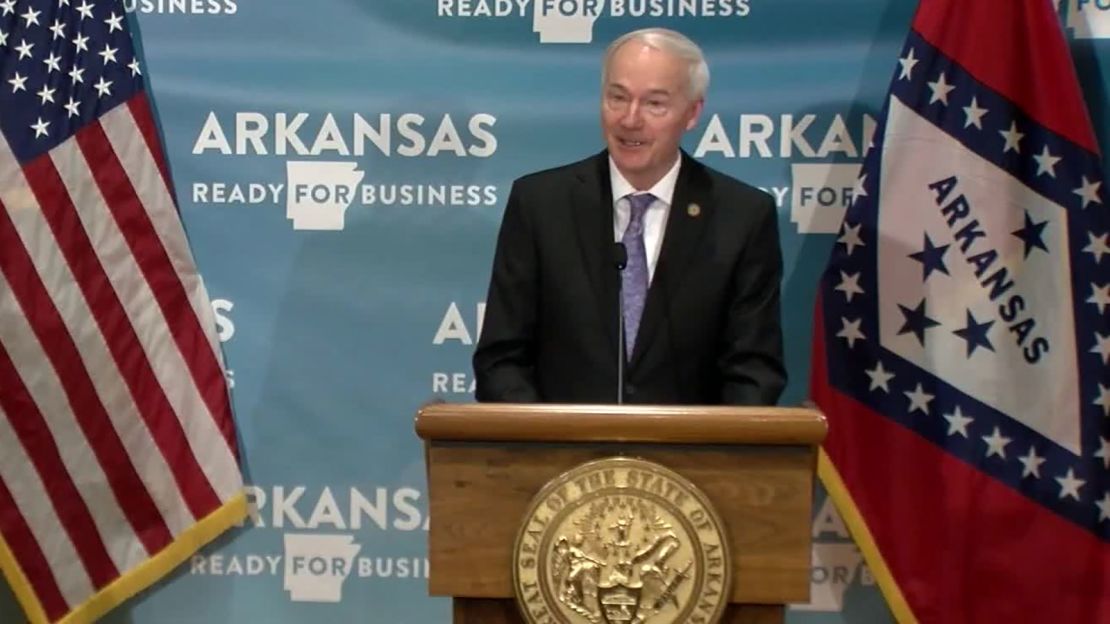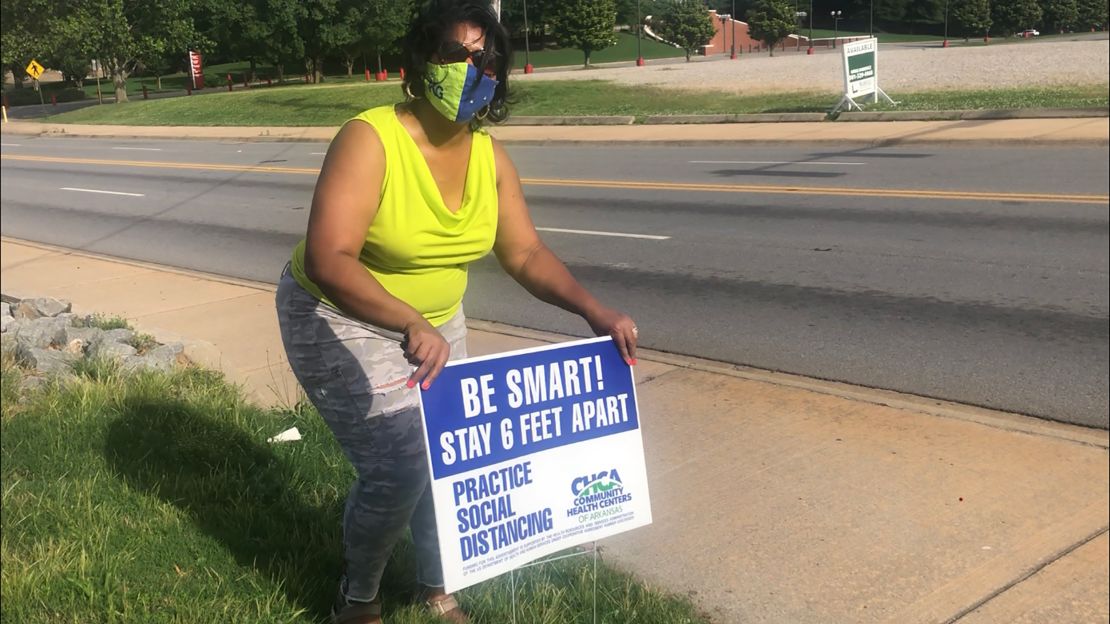During usual times, The Piano Bar in Fayetteville, Arkansas, is jammed with people standing shoulder to shoulder. Singing “Sweet Caroline” at the top of their lungs, they punch the fog-machine air with their drinks, shouting out the “bom bom bom” part of the song as performers duke it out on two pianos well into the middle of the night.
Over the last two months, the music has gone silent. The drinks have stopped. “Sweet Caroline” has been anything but sweet.
All as a result of the coronavirus pandemic – which has infected more than 1.6 million Americans, according to Johns Hopkins University data, and upended daily life for millions of people across the country.
But starting Tuesday night, The Piano Bar will open up its doors in a limited capacity, as Arkansas starts allowing standalone bars to serve customers again, bringing some much-needed relief to an industry that – unlike restaurants – has had little to no means of generating revenue during the shutdown.
Still, with Arkansas undergoing a second peak of coronavirus, and with social distance limitations making it financially impossible for some places to open, many bars across the state will keep their doors shuttered, waiting out the unprecedented storm that’s wreaked havoc on bars across the country.
“These are places of gathering, by nature,” said Bo Counts, the owner of a pinball bar called Pinpoint in Fayetteville. “That’s what we sell. We don’t sell Miller Lite. We sell social togetherness.”
Arkansas is one of a few states that didn’t issue an official stay-at-home order but still shut down more targeted parts of the economy, which has started reopening in recent weeks.
The state has seen a relatively low number of cases compared to other states, with close to 6,200 as of Tuesday afternoon, according to state data. But more than 1,000 of those cases have popped up in just the last five days, and while officials largely attribute the increase to a surge in testing, the numbers are still prompting a wave of concern across the state.
Gov. Asa Hutchinson made the striking announcement of the second wave over the weekend, just as crowds were starting to hit lakefront beaches for the holiday. He said Tuesday that officials were still waiting to see whether this is just a second peak in similar magnitude as the first, which happened a month ago, or whether the state was trending towards an even “higher peak.”

Still, he said the numbers shouldn’t shake the state’s confidence as it continues to reopen – but with caution.
“The economy is moving. People are going back to work. People are spending money. They’re gaining confidence,” he said during a press conference on Tuesday. “And the numbers that we see here today shouldn’t destroy that confidence. It’s just simply a reminder, let’s do the right thing.”
‘Be Smart Stay 6 Feet Apart’
Along E. Broadway St. in North Little Rock, Kristina Gulley spent Memorial Day putting up signs urging North Little Rock residents to practice social distancing. Voters recently elected Gulley as a Democratic candidate for local Justice of the Peace. The community advocate had a trunk full of signs that read “Be Smart Stay 6 Feet Apart.”

The signs were sponsored by Community Health Centers of Arkansas, which is hosting free coronavirus testing. Gulley, who wore a custom-made, lime-green and navy blue face mask with her initials K.G. surrounded by rhinestones, said she is worried not enough people are taking this new peak of coronavirus cases seriously.
“It just amazes me how so many people think it’s a hoax,” Gulley said. “This is serious. We can’t do things like we normally do.”
She said if coronavirus cases continue to spike, Hutchinson should consider putting more restrictions in place, like mandating that people wear masks when in public. It’s something Hutchinson tries to model himself, but he stops short of any mandates.
“Sometimes I think that people believe that if they don’t wear a mask they’re only endangering themselves, like…not wearing a helmet on a motorcycle and that’s just an expression of freedom,” Hutchinson, a Republican, said during a press conference. “And so we really have to drill into everyone and continue to educate, that it’s not about your health. It’s also about your neighbor’s health.”
Large crowds at Lake Hamilton
On Monday, large crowds gathered at Lake Hamilton, a popular lake southwest of Little Rock. Karen Lee, who traveled to the lake from Nashville, explained to CNN affiliate KARK why she was comfortable with being around crowds of people.
“I could get killed by Covid today, or I could get hit by a bus or a car tomorrow,” Lee said. “I am practicing proper hand washing and hygiene.
A recent swim party in Northeast Arkansas is also linked to a cluster of cases, according to state officials, though few details are known about the gathering.
At the end of the day, Hutchison, the governor, argues Arkansas is not a “heavy police state” when it comes to enforcing coronavirus restrictions, but he pledged Tuesday to “look more specifically” at what the state can do on big weekends.
Hutchinson also announced Tuesday the state is seeing a sudden increase in coronavirus cases among Latinos. Of the 151 cases reported on Tuesday, 42% were Latino, according to Arkansas Department of Health Director Nate Smith.
Concern in Little Rock
Little Rock Mayor Frank Scott said more testing is needed, especially in minority communities which have been hardest hit by the virus.
Scott described the latest spike of coronavirus cases as “alarming” and said the medical data is a reminder that the city and state must “remain cautious” in its reopening efforts.
Little Rock is the most densely populated city in the state of Arkansas. Scott said the phased reopening of the economy will only work if business owners are vigilant in following medical guidelines.
With standalone bars opening Tuesday, Scott fears a lax attitude among residents could force state officials to shut businesses down again. Bar owners, the mayor said, need to take social distancing seriously and enforce the state-mandated regulations.
“If residents do not take this seriously, this second spike could become even more alarming and actually hurt many of the businesses we’ve tried to prop up,” Scott said.
To reopen or not to reopen?
Aaron Schauer owns and performs at The Piano Bar in Northwest Arkansas. It’s a relatively new establishment in the popular Dickson Street entertainment district of Fayetteville.
Keenly aware of the recent spike in numbers, Schauer weighed in on the internal debate that he and other business owners face over reopening.
“It comes down to the value of a human life. There’s no real argument, because human life is priceless,” he said. “But at the same time, we’ve got to do what we got to do. And I think that’s just part of being an American, and part of being an Arkansan. You’ve got to go to work.”
Schauer ticked through the long list of steps he’s taking to open safely. Arkansas standalone bars are allowed to seat 33% of their seating capacity. Tables must be spaced 10 feet apart, and patrons sitting at the bar must be six feet apart. State guidelines require bartenders and other staff to wear masks and gloves, and customers must wear masks until they’re served a drink.
For Schauer’s bar, the capacity limit equals about 50 people. Reopening was not an easy decision, he said, for a myriad of reasons. Piano bars are known for their interactive atmosphere, with crowds of people singing loudly and customers approaching performers to request songs and leave tips.
“Normally we encourage people to sing. Well, if that’s going to make the particles travel farther, maybe for the time being we don’t encourage that, and we just, we still let them request songs,” Schauer said, adding they’ll also urge customers to request songs on the bar’s Facebook page – which the performers can check from their phones – or at a table placed 12 feet away from the pianos.
“We’re not sure how that’s going to look. We don’t know how people are going to react,” he said. “It’s uncharted territory.”
Bo Counts, who owns the pinball bar, said he’s deciding to wait until June to see how the case numbers pan out following the busy Memorial Day weekend.
His establishment – which has over 20 pinball machines – would also require a constant disinfection routine that he described as illogical and “impossible.”
Counts is an active voice in the entertainment scene in Northwest Arkansas and expressed long-term concerns about the fate of the hospitality industry, especially standalone bars and music venues that don’t also make money on food.
“How do you social distance in a place that is the antithesis of social distancing? And if you can’t, how do you survive?” said Counts. “That’s the big question a lot of us in this business in Arkansas have been asking ourselves.”
CNN’s Jeremy Grisham contributed to this report.






